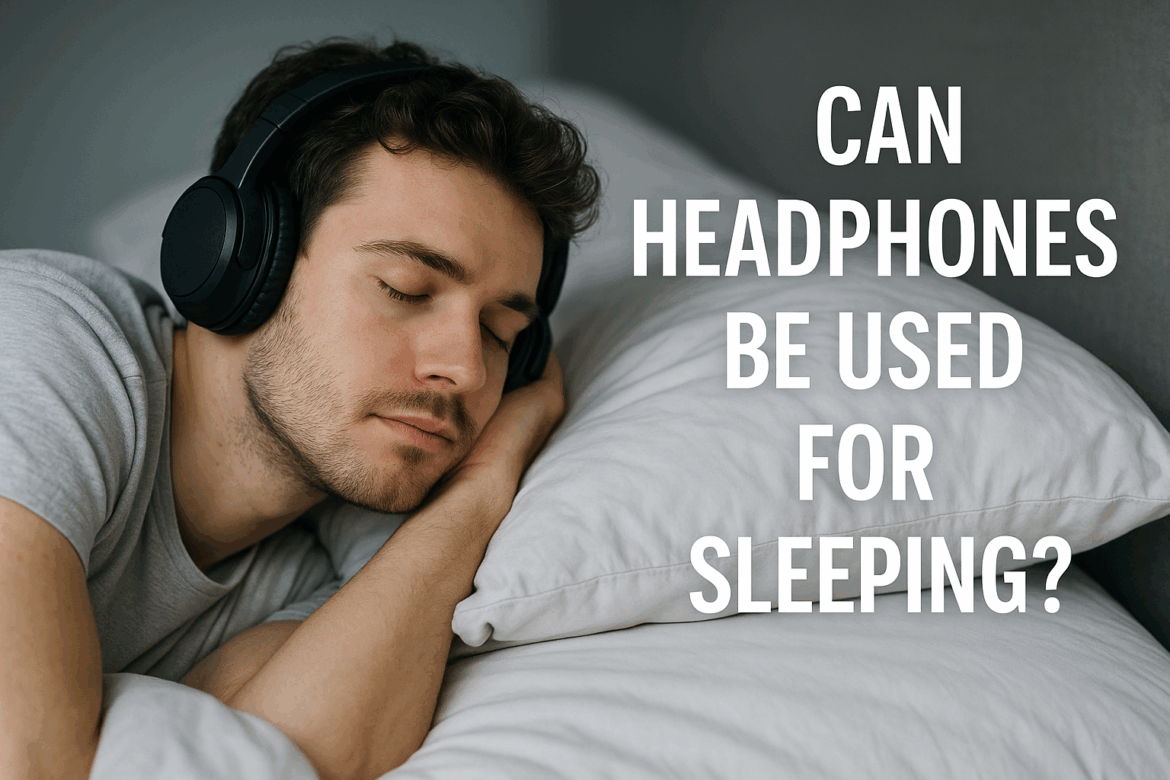Kann Kopfhörer Zum Schlafen geeignet?
Die sanfte Umarmung durch Musik oder das beruhigende Flüstern eines Podcasts können wie ein tröstliches Schlaflied wirken und uns ins Reich der Träume entführen. Doch die Frage stellt sich: Können Kopfhörer zum Schlafen verwendet werden? Bei dieser akustischen Erkundung verbinden wir technische Erkenntnisse mit poetischen Betrachtungen und vermitteln so ein differenziertes Verständnis dieses faszinierenden Themas.
Der Reiz des Klangs: Warum Kopfhörer zum Schlafen verwenden?
Für viele liegt der Reiz von Kopfhörern im Schlaf in der transformierenden Kraft des Klangs. Ob das rhythmische Rauschen der Meereswellen, das sanfte Prasseln des Regens oder ein Lieblings-Meditationslied – Klänge können einen Kokon der Ruhe schaffen. Aber warum genau tragen Menschen Kopfhörer im Bett?
-
Geräuschisolierung: Kopfhörer können Umgebungsgeräusche effektiv ausblenden und bieten so einen klanglichen Rückzugsort in einer Welt, in der es nie wirklich schläft. Dies ist besonders vorteilhaft für Menschen mit leichtem Schlaf oder für Menschen, die in lauten Umgebungen leben.
-
Personalisierte Erfahrung: Mit Kopfhörern lässt sich das Hörerlebnis individuell an die persönlichen Vorlieben anpassen, egal ob Podcast, Hörbuch oder einschläfernde Melodien.
-
Angstreduktion: Studien haben gezeigt, dass Musikhören Angstzustände reduzieren kann. Das intensive Erlebnis durch Kopfhörer kann diesen Effekt verstärken und so die Entspannung und das Einschlafen beschleunigen.
Die Risiken verstehen: Ist es sicher, Kopfhörer zum Schlafen zu verwenden?
Auch wenn die Vorstellung, mit einem ruhigen Soundtrack einzuschlafen, verlockend ist, ist es wichtig, sich über die potenziellen Risiken im Klaren zu sein, die mit der Verwendung von Kopfhörern beim Schlafen verbunden sind.
-
Hörschäden: Längerer Lärm, insbesondere bei hoher Lautstärke, kann mit der Zeit zu Hörschäden führen. Es ist wichtig, die Lautstärke auf einem sicheren Niveau zu halten.
-
Körperliche Beschwerden: Herkömmliche Kopfhörer können unangenehm sein, insbesondere wenn Sie auf der Seite schlafen. Der Druck auf die Ohren kann zu Wundsein oder sogar Schmerzen führen.
-
Bedenken hinsichtlich der Ohrengesundheit: Das Tragen von Kopfhörern über einen längeren Zeitraum kann das Risiko einer Ohrenentzündung erhöhen. Die geschlossene Umgebung um das Ohr kann Feuchtigkeit und Bakterienwachstum fördern.
Die richtigen Kopfhörer zum Schlafen auswählen
Die Welt der schlaffreundlichen Kopfhörer erfordert ein ausgewogenes Verhältnis zwischen Komfort, Klangqualität und Sicherheit. Hier sind einige Optionen, die Sie in Betracht ziehen sollten:
-
Schlafkopfhörer: Diese Kopfhörer wurden speziell für den Schlaf entwickelt und sind oft in ein weiches Kopfband eingebettet. Sie bieten Komfort und Bequemlichkeit, insbesondere für diejenigen, die nachts häufig ihre Position ändern.
-
Kabellose Ohrhörer: Kompakte und diskrete kabellose Ohrhörer können eine gute Option für Schläfer sein, die die Masse herkömmlicher Kopfhörer nicht mögen. Wichtig ist jedoch, dass sie gut sitzen, damit sie nachts nicht herausfallen.
-
Knochenleitungskopfhörer: Diese Kopfhörer übertragen den Schall durch die Schädelknochen und umgehen dabei das Trommelfell. Sie sind zwar für Ihre Umgebung nicht völlig geräuschlos, bieten aber eine einzigartige Möglichkeit, Audio zu genießen, ohne etwas in den Gehörgang einführen zu müssen.
Nachfolgend finden Sie eine Tabelle mit einem Vergleich verschiedener Kopfhörertypen, die zum Schlafen geeignet sind:
| Kopfhörer Typ | Komfortstufe | Klangqualität | Sicherheit | Preisspanne |
|---|---|---|---|---|
| Schlafkopfhörer | Hoch | Mäßig | Sicher | $20-$50 |
| Kabellose Ohrhörer | Mäßig | Hoch | Mäßig | $50-$200 |
| Knochenleitung | Mäßig | Mäßig | Sicher | $80-$150 |
Maximaler Komfort: Tipps zum Schlafen mit Kopfhörern
Um ein harmonisches Schlaferlebnis mit Kopfhörern zu gewährleisten, beachten Sie die folgenden Tipps:
-
Lautstärkeregelung: Stellen Sie die Lautstärke so ein, dass sie hörbar, aber nicht zu laut ist. Längerer Lärm kann Ihr Gehör schädigen.
-
Wählen Sie das richtige Material: Entscheiden Sie sich für Kopfhörer aus atmungsaktiven, hypoallergenen Materialien, um das Risiko von Reizungen oder Allergien zu verringern.
-
Stellen Sie einen Timer ein: Bei vielen Audio-Apps können Sie einen Timer einstellen, der den Ton nach einer bestimmten Zeit abschaltet. Dies kann dazu beitragen, unnötige Geräuschbelastung im Schlaf zu reduzieren.
Die Wissenschaft des Klangs: Wie Musik den Schlaf beeinflusst
Die Symphonie des Schlafs ist eng mit unseren Hörsinnen verknüpft. Studien zeigen, dass Musik den Schlafzyklus beeinflussen kann, insbesondere die REM-Phase, die für erholsamen Schlaf entscheidend ist. Musikhören vor dem Schlafengehen kann:
-
Entspannung herbeiführen: Langsame Musik kann die Herzfrequenz und den Blutdruck senken und den Körper in einen Zustand der Entspannung versetzen.
-
Verbessern Sie die Schlafqualität: Bestimmte Genres wie klassische Musik oder Ambient-Musik können die Schlafqualität verbessern, indem sie Schlafstörungen reduzieren.
-
Erleichtert die emotionale Befreiung: Musik kann emotionale Reaktionen hervorrufen und eine kathartische Entspannung ermöglichen, die Stress und Ängste lindern kann.
Fazit: Ein Wandteppich aus Klang und Schlaf
Das Schlafen mit Kopfhörern gleicht einer wohlkomponierten Symphonie, in der jede Note eine Rolle spielt und eine Geschichte der Ruhe und Erholung erzählt. Obwohl der Reiz des Klangs unbestreitbar ist, ist es wichtig, sich in dieser akustischen Landschaft mit Bedacht zu bewegen und ein Gleichgewicht zwischen Komfort, Sicherheit und persönlichen Vorlieben zu finden.
Im großen Traumteppich können Kopfhörer ein wertvolles Hilfsmittel sein, denn sie verwandeln die Einsamkeit der Nacht in eine Leinwand, die mit den Melodien der Träume bemalt ist. Wie bei jeder Reise ist es wichtig, behutsam vorzugehen und das Technische mit dem Poetischen in Einklang zu bringen, um ein erholsames und bereicherndes Erlebnis zu schaffen.
Zuletzt aktualisiert am 28. September 2025
